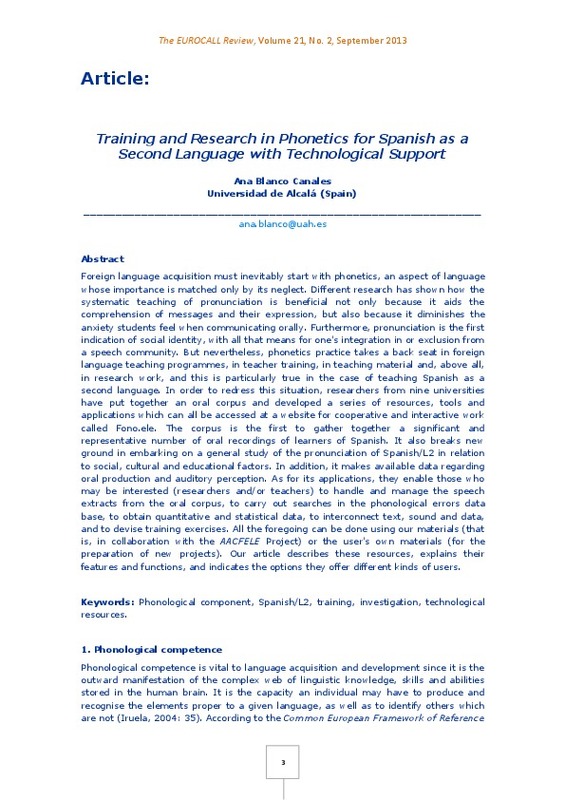JavaScript is disabled for your browser. Some features of this site may not work without it.
Buscar en RiuNet
Listar
Mi cuenta
Estadísticas
Ayuda RiuNet
Admin. UPV
Training and Research in Phonetics for Spanish as a Second Language with Technological Support
Mostrar el registro sencillo del ítem
Ficheros en el ítem
| dc.contributor.author | Blanco Canales, Ana
|
es_ES |
| dc.date.accessioned | 2020-03-09T10:15:23Z | |
| dc.date.available | 2020-03-09T10:15:23Z | |
| dc.date.issued | 2013-09-29 | |
| dc.identifier.issn | 1695-2618 | |
| dc.identifier.uri | http://hdl.handle.net/10251/138526 | |
| dc.description.abstract | [EN] Foreign language acquisition must inevitably start with phonetics, an aspect of language whose importance is matched only by its neglect. Different research has shown how the systematic teaching of pronunciation is beneficial not only because it aids the comprehension of messages and their expression, but also because it diminishes the anxiety students feel when communicating orally. Furthermore, pronunciation is the first indication of social identity, with all that means for one's integration in or exclusion from a speech community. But nevertheless, phonetics practice takes a back seat in foreign language teaching programmes, in teacher training, in teaching material and, above all, in research work, and this is particularly true in the case of teaching Spanish as a second language. In order to redress this situation, researchers from nine universities have put together an oral corpus and developed a series of resources, tools and applications which can all be accessed at a website for cooperative and interactive work called Fono.ele. The corpus is the first to gather together a significant and representative number of oral recordings of learners of Spanish. It also breaks new ground in embarking on a general study of the pronunciation of Spanish/L2 in relation to social, cultural and educational factors. In addition, it makes available data regarding oral production and auditory perception. As for its applications, they enable those who may be interested (researchers and/or teachers) to handle and manage the speech extracts from the oral corpus, to carry out searches in the phonological errors data base, to obtain quantitative and statistical data, to interconnect text, sound and data, and to devise training exercises. All the foregoing can be done using our materials (that is, in collaboration with the AACFELE Project) or the user's own materials (for the preparation of new projects). Our article describes these resources, explains their features and functions, and indicates the options they offer different kinds of users. | es_ES |
| dc.language | Inglés | es_ES |
| dc.publisher | Universitat Politècnica de València | es_ES |
| dc.relation.ispartof | The EuroCALL Review | es_ES |
| dc.rights | Reconocimiento - No comercial - Sin obra derivada (by-nc-nd) | es_ES |
| dc.subject | Phonological component | es_ES |
| dc.subject | Spanish/L2 | es_ES |
| dc.subject | Training | es_ES |
| dc.subject | Investigation | es_ES |
| dc.subject | Technological resources | es_ES |
| dc.title | Training and Research in Phonetics for Spanish as a Second Language with Technological Support | es_ES |
| dc.type | Artículo | es_ES |
| dc.identifier.doi | 10.4995/eurocall.2013.9787 | |
| dc.rights.accessRights | Abierto | es_ES |
| dc.description.bibliographicCitation | Blanco Canales, A. (2013). Training and Research in Phonetics for Spanish as a Second Language with Technological Support. The EuroCALL Review. 21(2):3-26. https://doi.org/10.4995/eurocall.2013.9787 | es_ES |
| dc.description.accrualMethod | OJS | es_ES |
| dc.relation.publisherversion | https://doi.org/10.4995/eurocall.2013.9787 | es_ES |
| dc.description.upvformatpinicio | 3 | es_ES |
| dc.description.upvformatpfin | 26 | es_ES |
| dc.type.version | info:eu-repo/semantics/publishedVersion | es_ES |
| dc.description.volume | 21 | es_ES |
| dc.description.issue | 2 | es_ES |
| dc.relation.pasarela | OJS\9787 | es_ES |







![HTML file [HTML]](/themes/UPV/images/html.png)

